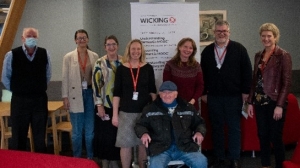
Wicking Centre Appeal – Rowena and Roger
Over $20,000 was raised during the Wicking Dementia Research and Education Centre’s most recent giving appeal. The initiative raises funds to support our research and education programs. Held annually, the 2021 appeal featured Rowena Howard and her father Roger. Roger has Alzheimer’s Disease and Rowena has documented her family’s journey with dementia in a series of short films to highlight the need for more support for those living with dementia and their caregivers. The Wicking Dementia Centre recently had a visit from Rowena, her husband Grant and her father Roger who met with some of the successful funding recipients from the appeal. Successful projects which were funded thanks to the generosity of our supporters include: o “A unit dedicated to dementia in Indigenous peoples in the online Dementia Care Degree Program.” (Lyn Goldberg, Clair Andersen, Jennifer Evans, Maneesh Kuruvilla, Tanya Schramm, Claire Eccleston). o "Development of an advisory group to identify participant recruitment strategies for establishing a dementia risk profile in Afghan refugees and asylum seekers in Tasmania." (Mohammad Shoaib Hamrah, Larissa Bartlett, Sunny Jang). o “Now this is an exciting project. Exciting tools to excite neurons will excite students.” (Sharn Perry, Lyzette Matthews, Jan Leng Cheng, Tony Cook) o “Laughter ISLAND: Using comedy to promote brain health and dementia risk reduction behaviours.” (Alison Canty, Maneesh Kuruvilla, Helga Merl, Sam Poulson) o “Sniffing out Dementia: Olfactory dysfunction in an ‘at-risk’ group of older Tasmanians.” (Samantha Bramich, Jane Alty, Maneesh Kuruvilla, Leah Beauchamp) o “The design and development of a guide for medical health practitioners to facilitate the discussion and diagnosis of dementia within Tasmanian minority ethnic communities.” (Sunny Jang, Maneesh Kuruvilla, Hoang Nguyen, Helga Merl, Katharine Salmon, Mohammad Shoaib Hamrah, Yashi Koirala) o “Microglial phenotypes as a risk factor for dementia – how we can begin to decipher and reprogram the immune cells of the brain to improve outcomes.” (Jenna Ziebell, Yasmine Doust) Click HERE if you would like to help us continue our mission to make a positive difference in the lives of people with dementia and those that care for them.
|